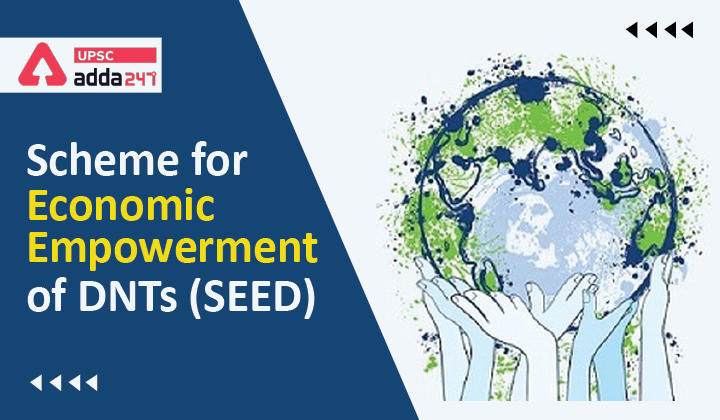Table of Contents
Scheme for Economic Empowerment of DNTs: Relevance
- GS 2: Government policies and interventions for development in various sectors and issues arising out of their design and implementation.
Scheme for Economic Empowerment of DNTs: Context
- Recently, Ministry of Social Justice & Empowerment has launched the Scheme for Economic Empowerment of DNTs (SEED) for the welfare of De-Notified Tribes (DNTs), Nomadic Tribes (NTs) and Semi Nomadic Tribes.
SEED scheme: 4 Components
- Educational empowerment– Free coaching to students from these communities for Civil Services, entry to professional courses like medicine, engineering, MBA, etc.
- Health Insurance through PMJAY of National Health Authority.
- Livelihoods to support income generation, and
- Housing (through PMAY/IAY)
Features of SEED scheme
- The scheme will ensure expenditure of Rs.200 crore to be spent over five years beginning 2021-22.
- The DWBDNCs (Development and Welfare Board for De-notified, Nomadic and Semi-Nomadic Communities) has been tasked with the implementation of this scheme.
- An online portal has been developed by the department which will ensure seamless registration and will also act as a repository of the data on these communities.
DNTs, NTs, SNTs in India
Before independence
- DNTs, NTs, SNTs are the one of the most deprived and economically weaker communities in India.
- The misery of these communities began with the enactment of the Criminal Tribes Act, 1871 during the British rule.
- These communities were subjugated, persecuted and neglected. The policies of the colonial government affected lives and livelihood adversely.
- They were branded as criminals under various colonial acts, which led to the forcible alienation from their traditional occupations and habitations.
After independence
- The first commission was set up in October 2003 to look into the problems of these communities. The Renke Commission was set up in 2008.
- The National Commission was constituted in 2015 under the chairmanship of Shri Bhiku Ramji Idate for planned development of these communities.
- Based on the recommendation of this commission, the Government of India set up the Development and Welfare Board for DNTs, SNTs &NTs (DWBDNCs) in 2019.
- The Government also decided to create an umbrella scheme for empowerment of these communities and accordingly, the Scheme for Economic Empowerment of DNTs, SNTs &NTs (SEED) has been formulated with four components that affect their livelihood.
Who are DNT in India?
- The term ‘De-notified Tribes’ stands for all those communities which were once notified under the Criminal Tribes Acts, enforced by the British Raj between l87l and I947.
- These Acts were repealed by the Independent lndian Government in l952, and these communities were “De-Notified”. A few of these communities which were listed as de-notified were also nomadic.
Difference between DNTs, NTs and SNTs
- Terms such as nomads and semi-nomads are applied to ‘social groups who undertook a fairly frequent, usually seasonal physical movement as port of their livelihood strategy in the recent past.
- The term semi-nomad is mostly used to describe those sections of nomads whose duration, distance and frequency of movement is comparitively less than others.
- The distinction between nomads and semi-nomods do not involve distinguishable ethnic categories or social groups, it rather describes the degree of mobility practiced by them.
Status of DNT in India
- In India, roughly 10 per cent of the population is De-notified and Nomadic.
- While the number of De-notified Tribes is about 150, the population of Nomadic Tribes consists of about 500 different communities.
- While the Denotified Tribes have almost settled in various States of the country, the Nomadic Communities continue to be largely nomadic in pursuit of their traditional professions.
Schemes for DNTs in India
- Ambedkar Pre-Matric and Post-Matric Scholarship for DNTs : This Centrally Sponsored Scheme was launched w.e.f. 2014-15 for the welfare of those DNT students who are not covered under SC, ST or OBC.
- Nanaji Deshmukh Scheme of Construction of Hostels for DNT Boys and Girls. This Centrally Sponsored Scheme launched w.e.f. 2014-15 aimed to provide hostel facilities to those DNT students; who are not covered under SC, ST or OBC; to enable them to pursue higher education.
- From the year 2017-18, the scheme “Assistance to Voluntary Organization working for the Welfare of Other Backward Classes (OBCs)” has been extended for DNTs and EBCs.
Also Read:





 TSPSC Group 1 Question Paper 2024, Downl...
TSPSC Group 1 Question Paper 2024, Downl...
 TSPSC Group 1 Answer key 2024 Out, Downl...
TSPSC Group 1 Answer key 2024 Out, Downl...
 UPSC Prelims 2024 Question Paper, Downlo...
UPSC Prelims 2024 Question Paper, Downlo...




